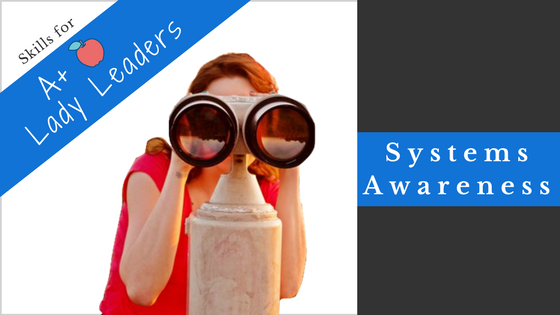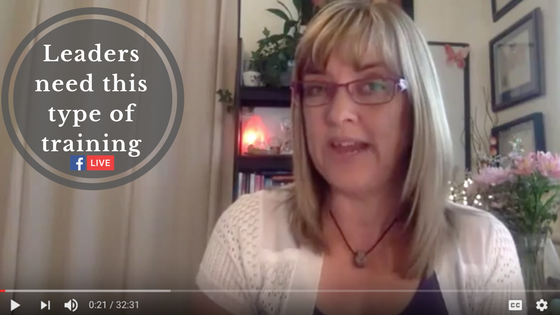|
Spending your entire leadership day with your head down, pouring over only what’s in front of you, won’t get you very far. Effective Lady Leaders regularly lift their head up, look around from side to side and peer off into the future. They are “systems aware.”
It’s time to take a look at how you can expand your awareness to this broader and longer view of your work.
Excellence in Leadership Series
This is our second week in the Excellence in Leadership Series, which is looking at the skills needed to be an A+ Lady Leader. I am pulling these essential skills from The Leadership Circle Profile - TLC. TLC is a tool I use with the ladies in my Women with Grit program to help them become exceptional leaders. Systems Awareness This week in the series, I am focusing is on the skills of broadening and lengthening our view. That expanded view is what systems awareness is all about. When you are cognizant of the systems around you, you lead with the bigger picture in mind. Instead of the tiny microscopic scene of the daily crises, the fires that pop up and the problem of the day in front of you, you adopt a macro perspective. Rather than using a microscope to dissect the immediate future, think of using a periscope and a telescope to look around you and ahead of you.
A community focus considering your long-term legacy
The first thing this expanded perspective allows you to do is reawaken your concern for the welfare of the community you serve or the larger global community you are connected to. Next, it helps you to then connect your day-to-day work to the long lasting legacy you leave on that community. You start to consider how your leadership and the work your team does is of service to future generations? When you are NOT Systems Aware To put the skill of systems awareness into perspective, let's look at where many leaders are now. Instead of this long and broad view, many of us have a very tiny view. We adopt a short-term focus. So many leaders live in reactive mode, solving whatever problem pops up, putting out fires, looking for quick fixes or Band-Aid Solutions Slow down and lift your head up Instead, when you hone the skill of being more focused on the bigger systems, you widen your view and focus on the impact you have on the community, over the long-term. This requires you to step back from the urgency to fix the current crisis and lift your head up. It is about slowing down, looking around and then choosing a response rather than reacting. 3 skills to enhance The three skills associated with increasing your system’s awareness are developing what is called community concern, focusing on being able to sustain your productivity and examining how systems are intertwined which is being a systems thinker.
Grow your Systems Awareness Skills
Becoming systems aware helps you to lift your head up and take a look around. Looking up and around helps you to both keep your eye on the prize (your vision) and help you know what’s going on, that can either help you or hinder you on the way to that view way far off in the distance. Hone the skills of:
Want to learn more?
You can learn more here by listening to this session on how you can increase your skills to increase your systems awareness. Then, get awaken your systems awareness, download the guide below which will help to broaden and expand your view of your work.
1 Comment
Let me start by asking you a question: Are you achieving...
If you are an A+ Lady Leader, you know the answers to these questions and have the skills to do just that!
You need all three parts It's not just about the results or the just process. You all know wealthy individuals, who are complete jerks and have lost everyone they loved along the way. You know of very successful organizations with nasty work cultures. You know really good people, who never achieve anything because they are too nice. You probably also know wonderful, caring people, who work hard every day, but never get anywhere because they don’t have definite aspirations. I know, none of these is what you are looking for!
The point is, we need to get the right RESULTS, in the right WAY for the right REASON
Any one of the 3 points is important, but to be that A+ Lady Leader, you need to combine all 3.
Here’s how: Getting your WHAT right The skill you need to develop: Being GOAL ORIENTED: When you hone this skill, you set goals and focus on goal achievement. That means when you establish goals, you don’t stop there. You create timelines to achieve those goals. You then break down your objective into smaller tasks, take action on some parts and delegate others. You follow up with your team and keep the process on track. The end goal is high performance and goal attainment. How to develop this skill Practice setting bigger goals and get used to breaking goals down into weekly tasks. Work with your team to share the work and progress.
Getting your HOW right
The 2 skills you need to develop are: Having a STRATEGIC FOCUS: This means you have a good process in place for maintaining an ongoing strategic perspective within your organization. A strategic focus includes more than setting goals. It is looking at how your team’s or your organization’s work fits into the bigger picture. It starts with strategic planning, but it doesn’t end there. To truly have a strategic focus, you need to keep the process alive throughout the year. The ongoing process includes regularly reviewing goals, both for progress, but also to see if they are still priorities. How to develop this skill Start developing this skill by scheduling time monthly in your agenda to take a look at the bigger picture and see how it fits in with today and next week. What has happened that may have changed the original strategic plan?
Being DECISIVE:
This is the ability to make decisions, including tough ones, in a timely manner. You need to make decisions under pressure and be comfortable moving forward in uncertainty. How to develop this skill To become more adept at being decisive, you need to heighten your awareness around the decisions you are faced with.
Getting your WHY right
The skill you need to develop is: Being PURPOSEFUL & VISIONARY: You need to clearly communicate and role model a commitment to both your personal purpose and vision and the organization’s deeper sense of purpose How to develop that skill Spend time individually and with your team crafting a future vision. This vision can include things such as goals and plans. More than that though, you will need to take a look at the values you want to honour, the workplace culture you want to have an choosing the impact of your lasting legacy on the community you serve.
Leadership Competencies
These skills listed above come from The Leadership Circle Profile. This is a 360 tool I use with my A+ Lady Leaders who I coach and are involved in The Training Library The Leadership Circle describes them as part of the Creative competencies that are well-researched competencies that measure how leaders achieve results, bring out the best in others, lead with vision, enhance your own development, act with integrity, and encourage and improve organizational systems.
Want to learn more?
Anyone can achieve results. What they actually achieve, how they do it, and why they are even bother trying to do, makes an incredible difference. I know, if you want to be an A+ Lady Leader, that you not only care about the what, but also the how and why. You can learn more here by listening to this session on how you can increase your skills to achieve the right results, for the right reason, in the right way. Then, get a sense of how you are doing with the skills to achieve results with the guide below.
Are you a leader or a manager? We use the words managing and leading interchangeably. However, these terms don’t mean the same thing. Leadership is different than management. The truth is, you likely do both, especially if you work in a smaller organization. Sometimes you are managing at one time and leading at a different time. On other occasions, you are doing both managing and leading almost simultaneously. So why bother understanding the difference between management and leadership then? The answer is simple. You need to develop your skills in both areas. Organizations put too much focus on developing only management skills. However, without developing your leadership skills as well, you’ll struggle to get where it is you want to be with your team. You’ll probably also feel more frustrated. The easiest way for me to explain the difference to you is to think about a boat. A manager keeps the boat from tipping over side-to-side. A leader steers the boat forward. You need to do both if you are going to get anywhere. The differences Here are the differences between leadership and management in a nutshell:
Example #1 - Employee Development MANAGING: Take for instance the development of employees. Booking regular supervision meetings with your staff members, sending employees on training, scheduling your people into the programs and ensuring annual performance reviews get completed all management tasks. These things are necessary for sure! LEADING: In addition to those management tasks, a leader will have a conversation with the employee about their skills and talents. She will inspire them to utilize their strengths. A leader may move them into positions they are not completely ready for. The leader knows that stretching this person is a risk that will serve both the employee and program well, even though it will be a messy transition. However, the leader has a clear picture in her mind of what will be on the other side of those rapids, and they communicate that to the individual and the team. Example #2 - Contract Changes LEADING: When the funder announces modifications to the way contracts are being released, the leader already saw it coming. She has been actively scanning the horizon. In doing so, she knows how those changes will strategically fit that into where the program is. She is always aware how they can navigate the upcoming changes. MANAGING: The manager in her will mitigate the risks to the existing program budgets. She will plan meetings with stakeholders. The manager role will have her prepare to communicate the changes to the team. The differences: Management training The training you need to be a great manager will be in learning to do things such as preparing and reading budgets and learning how to build strategic plans complete with goals and objectives and timelines. Management training will help you to write policies and follow procedures. This kind of training will ensure things get done in a way that keeps the program afloat. The differences: Leadership Training In contrast, the training you need as a leader will help you understand how to communicate to your team in a way that builds trust and motivates them. It will be about creating a vision and then learning to inspire people around you to come alongside you to achieve that vision, even when it seems risky, scary or impossible. Leadership training will help you steer the boat forward. Leadership isn't about your name tag Leadership isn’t a title or a role. Leadership is a way of being. It is the way you take action and the manner in which you communicate. When you are leading, your personality, style, vision, method, and character all serve to influence your followers. That influence sways them towards your future vision. The mistake we often make The mistake we often make is in thinking that we can learn management skills. This mindset error leads us to believe we either have the ability to lead or not. Certainly, our ability to lead is impacted by our genes, though our childhood experiences and as a result of our past career. There is not doubt that, that all shapes who we are. The key is in deciding what you will do with all of the cards that you have been dealt. That is where leadership training comes in. Great leaders work on themselves To become a great leader, you need to commit to personal development. Leadership starts with self-leadership. That means you understand what makes you tick, what is important to you and why it is central to your beliefs. Clarity on these fundamental drivers helps you craft your vision. The greatest of leaders then choose the character strengths they want to strengthen so they can inspire their followers to help them achieve that mission. Traits of great leaders Effective leadership is about integrity and trust. It is about the courage to take risks and the awareness to maintain your composure. When you lead most powerfully, you are serving others, with a vision, much bigger than yourself in mind. All of these are things that can be learned, honed and strengthened. You just have to do the work. The work required to be one of the greats Oh, and did I neglect to tell you…it takes a lot of work? Yes, leaders are in it for the long haul. That’s because, like Christopher Columbus, they know, that even though the majority may see it one way, that doesn’t make it so! The greatest of leaders push forward towards their vision, with a great team around them who trusts the leader, and believes in the same vision.
|

Available on Amazon
Archives
May 2024
|
|
Leadership TRAINING for Nonprofit Leaders
Become a confident and competent nonprofit Leader: Join The Training Library membership Executive and Leadership COACHING Leadership Coaching for Nonprofit Executives, Leaders and ManagerCoaching |
PODCAST for Nonprofit Leaders
The Surviving to Thriving podcast: Strategies, systems and support to lead your nonprofit with confidence FREE RESOURCES to Grow your Leadership Skills Free Leadership Training Resources, Worksheets and Templates |
Become a CONFIDENT LEADER
|
















 RSS Feed
RSS Feed
